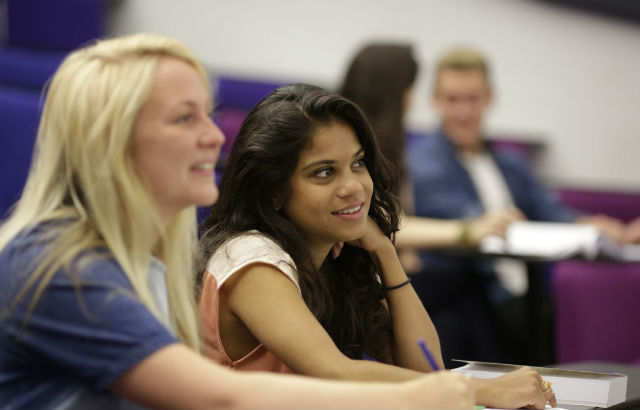Tertiary Education for the 21st Century: the who, the what, and the how - recapping the 2023 Drapers’ Lecture
Each year, the Drapers' Company supports a lecture on learning and teaching, hosted by Queen Mary University of London.

Students in a lecture theatre
This year’s talk was given by Mary Curnock Cook CBE, former Chief Executive of UCAS and a distinguished figure in UK higher education. Mary discussed the current state of tertiary education and potential improvements to ensure it stays both modernised and as beneficial as possible.
She opened by outlining the various pathways to higher education. This includes what was described as the ‘superhighway’ – the well-trodden path of many from GCSE to A-level to university. She noted however that lots of the alternative roads provide students with less guidance and offer a less clear route to higher education. These include qualifications such as BTECs, T-levels and apprenticeships. Highlighting their importance, Mary emphasised that “these alternative routes often disproportionately support those from less affluent backgrounds.”
Drawing attention to the importance of collaboration, Mary stated that there are currently too many partially built or poorly branded educational pathways: “The reason A-levels and GCSEs have succeeded over such a long period of time is because they command high levels of public understanding and trust,” she said. Urging the need for a joined-up approach, she called for greater partnership between higher education and further education providers.
This led to what she called the “urgent task” of building 21st century skills without basing it on legacy thinking, which she argued is not a basis for a tertiary system preparing people for a fast-paced technological age. Asking what would be needed to make a more coherent system, she said: “We need a diverse offering, for which we need coherent pathways from schooling to university. I’d also encourage full engagement with the recently proposed Advanced British Standard. For example, we do need more updated thinking around maths to make it more engaging, more obviously relevant, and more inclusive.”
The lecture segued into skills demands constantly changing, demonstrated by the current spotlight on artificial intelligence and the enormous as well as rapid uptake of Chat GPT. “The changing demand for some occupational skills coupled with the growing demand for more stable, sector-neutral skills [soft skills] are a critical backdrop for a tertiary education strategy,” Mary explained. “Tertiary education needs to prepare students for the employment needs of today. Students need to be able to work in a technological environment, but also around other humans. Those inter-personal skills are vital.”
She added that essential skills had to be foregrounded in programmes, with too many students left lacking confidence in essential and transferrable skills – for instance creative thinking or problem solving - and demonstrating them in a work setting.
She concluded by noting the importance of universities diversifying their offer to better meet the needs of students. This includes programmes, how education itself is delivered, and forging partnerships with further education colleges. Mary told her audience: “We have to shift out of subject and skill silos and adopt multi-disciplinary approaches instead.”
Professor Stephanie Marshall, Vice-Principal (Education) at Queen Mary University of London said: “We want to thank Mary for giving this year’s Drapers’ Lecture. Diversifying education is something we’ve long been passionate about at Queen Mary and we were all keen to hear the thoughts and ideas of someone with so much experience in Higher Education. It was a thoroughly engaging talk covering some of the biggest priorities, opportunities and challenges facing tertiary education and certainly gave everyone in the room lots to think about.”